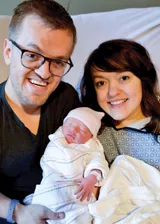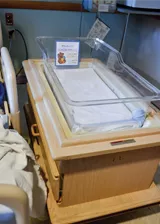
When Beth and Alex Korth learned that Beth was pregnant with their first child in the summer of 2020, they were excited but also nervous. It’s daunting enough to navigate a pregnancy in the middle of a pandemic. But it’s a particularly tall task when the world isn’t designed to cater to your unique needs. The Korths were born with a bone growth disorder called achondroplasia, more commonly known as dwarfism. So they knew they would need support and understanding along the way for their pregnancy journey to reach a successful, happy and healthy conclusion.
The Korths chose Tufts Medical Center on the recommendation of Beth’s mentor, who had delivered her children at Tufts Medical Center and spoke highly of the high-risk team. So Beth and Alex made their first appointment in the Maternal-Fetal Medicine clinic prior to eight weeks gestation. It was there that they first met Maternal-Fetal Medicine Physician Britta Panda, MD, PhD.
“Dr. Panda is just so warm and welcoming,” said Beth. “She really was there for us every step of the way, from that first meeting through the whole nine months.”
Health concerns: Baby and mom
The Korths learned that since they both had achondroplasia, there was a 25 percent chance that the baby would have a severe form of the disorder and would die shortly after birth. So following a genetic consultation, they decided to get chorionic villus sampling (CVS) at 11 weeks to ensure the baby was healthy. Thankfully it was.
Relieved about the baby, Beth’s concerns turned towards her own health. How would her body react to the pregnancy? Would her joints and back be able to handle it? And how would the care team approach the delivery, which would need to be done via scheduled caesarean section? The Korths shared their thoughts with Dr. Panda.
Self-advocate
“Since I was a little girl, I have always made sure to speak up and advocate for myself,” said Beth. “My parents taught me to never assume that people I meet or work with will know what accommodations I need. Dr. Panda and the Tufts MC team were so flexible and helpful and they really listened to my suggestions to allay my fears and enhance my hospital experience.”
Prior to the delivery, Dr. Panda purchased a step stool for the Korths to use at clinic appointments and the entire care team educated themselves on best practices for prenatal care for patients with achondroplasia. And for weeks in advance, they prepared for the big day.
“We basically ran through delivery day, looking through Beth’s eyes,” said Dr. Panda. “We tried to anticipate what she and Alex might need before, during and after the baby’s birth.”
The pregnancy went smoothly. Beth only gained nine pounds, while Alex started a workout routine, lost 25 pounds and built muscle to be sure he could physically care for the baby. The Korths also made sure to eat a healthier diet.
A special delivery
Prior to the scheduled March 5 c-section, Beth had an anesthesia consultation with Anesthesiologist and Director of Acute Pain Service Sean Gallagher, MD, since regional anesthesia can be more challenging in patients with achondroplasia.
“He had a plan for an achondroplasia delivery that made me feel so comfortable,” said Beth. “He took it slow in the OR and explained everything every step of the way.”
Dr. Panda performed the c-section, which went quickly and as planned. Beth gave birth to a healthy baby boy, Everett, who weighed 6 pounds, 8.2 ounces and measured 19.5 inches long. He does not have achondroplasia and will be average height – an outcome occurring in just 25 percent of births to two parents with achondroplasia.

After the delivery, Dr. Panda presented the Korths with a room in the Mother-Infant Unit specifically tailored to their needs: a hemmed hospital gown for Beth to fit her properly; a bed lower to the ground so Beth could easily get in and out; and a bassinet custom-made by the Facilities department to be just the right height for Beth to pick up and put down Everett from her bed. And the care team was very accommodating of Alex, permitting him to stand and hold the baby, instead of sitting in a chair.
“I cannot speak more highly of the doctors, nurses and staff at Tufts Medical Center,” said Beth. “Everyone always seemed like they were watching out for us. They gave us peace of mind.”